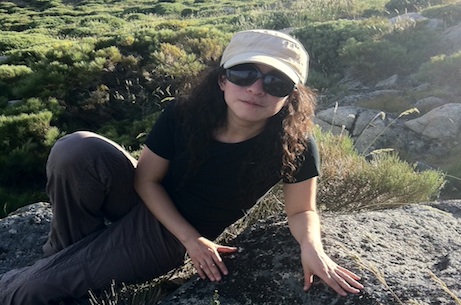
Cecilia Martinez Perez’s research focuses on the history of plant pollination and looks at what makes a plant more appealing to pollinators like bees.
News headlines proclaim a crisis in bee numbers and say the implications for agriculture are huge. Cecilia Martinez Perez’s research focuses on the history of plant pollination and looks at what makes a plant more appealing to pollinators like bees. The research could eventually lead scientists to develop ways to improve crops in ways that boost pollination.
Her PhD in Plant Sciences studies the evolution of floral traits like colour and shape in snapdragons and how that affects pollination by either bees or birds. “I am studying whether the flowers change traits depending on who they are pollinated by,” she says. In order to do this, she studies the genes that control particular traits and whether traits change because the gene has, for instance, stopped working or that function of the gene is not being expressed.
Pollinators of the plant are different in Latin America, where Cecilia [2011] is from, than in Europe. They tend to be hummingbirds in Latin America and bees in Europe. Cecilia’s work compares the two and maps changes over time. “We can callibrate how long ago the changes took place,” she says, “and we can see what traits are attractive to different pollinators and whether we need to improve the crops to make them more attractive to bees which are in decline around the world.”
Languages
Cecilia’s passion for biology, particularly molecular biology, has been long-standing and she has also been involved in ecological work in her native Mexico. She was also keen to travel and learnt several languages. A trip to the UK when she was 17 convinced her she wanted to study in the UK.
Her father was particularly keen that she learn English so she started private lessons while she was still in kindergarten and continued every afternoon after school. In her final year of primary school she switched to a bilingual school and also took private French classes. Coming from a small town in south Veracruz, Mexico, she was keen to travel and from age 10 the family would travel abroad. Her last year of primary school was at a bilingual English/Spanish school and she also took private French classes. At undergraduate level she also studied German and Italian.
Dance
Besides biological sciences, Cecilia’s other passion at secondary school was dancing, something she has continued at Cambridge when she started a Mexican dance group. From the age of 14 ballet was a major part of her life and she split her time between it and her schoolwork. From her first year of secondary school she had fallen in love with biology and cites inspirational biology teachers as helping to convince her to something related to that when she left. However, her leaning was more towards academic research than being a doctor, even though both her parents were doctors.
She did apply to medical school when she finished school, but she also applied to do biomedical engineering and biology. She was accepted on all three courses. “My heart was always with pure biology,” she says. She found a course which allowed her to major in biology and do a minor in dance and she did two years of contemporary dance alongside her biology studies. “It was a good balance. There was the hard data of biology and the expressive art of dance,” she says. In the end, though, the demands of her biology course were too much and she had to make a decision. She realised that, as much as she loved dance, she was not going to do it professionally so she gave up her minor but kept up her dancing through private classes.
Her degree was four and a half years long and the last two years were devoted to an ecology research project. She studied how the size of crustaceans change as a result of being in a polluted environment. “I expected that in the more polluted areas there would be no crustaceans or they would be smaller, but she found that there were many in the polluted areas and that they fed on waste. It was the first time I did proper research where you venture into the unknown. I knew I wanted to do a PhD from that moment,” she says.
UK-bound
She decided to apply for a masters in biological science at Oxford, having “caught the UK bug” on a summer workshop trip with her sister when she was 17. She found it hard to adapt to the Oxbridge tutorial system and the emphasis on independent study. She worked on two projects: one in molecular biology which was very laboratory-based and the other on bird behaviour. She found that she preferred molecular biology and says she had long been interested in evolutionary biology.
She returned to Mexico after the course and worked as a volunteer in the botanic gardens in Puebla and taught ballet at a dance academy. At the botanic garden she helped sort out the species names and mapped the garden.
Cecilia applied to Cambridge and for a Gates Cambridge Scholarship in 2010 and arrived in Cambridge in 2011. She hopes to finish her PhD in the next year.












